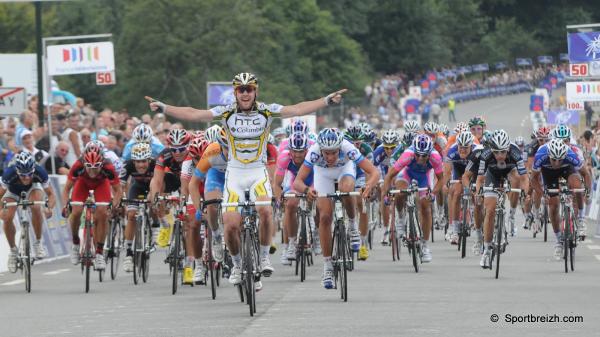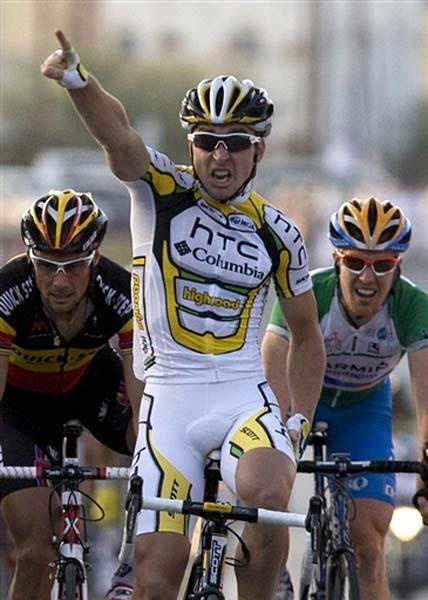HTC's sprinters vie to fill Greipel's place
Goss, Howard likely candidates for second string
The latest race content, interviews, features, reviews and expert buying guides, direct to your inbox!
You are now subscribed
Your newsletter sign-up was successful


The loss of André Greipel to Omega Pharma-Lotto left a big hole in the HTC-Highroad team for 2011, but the squad has plenty of options to fill the spot of the German who was the peloton's most successful rider in 2010. Greipel took four riders with him to the Belgian team, including lead-out men Marcel Sieberg and Adam Hansen, but HTC has several riders who could step up and fill those voids.
While the team's number one sprinter will remain Mark Cavendish, the team's sprint adviser Erik Zabel and directeur sportif Allan Peiper will be looking closely at the other fast men on the team when formulating Cavendish's lead-out train and creating a new second string sprint team.
"Greipel has won the most races two years in a row and has been the backbone of our team," Peiper told Cyclingnews at the team's camp in California. "But then we get Leigh Howard coming on - he won Koolskamp in a Cavendish-like fashion and he beat the top sprinters in Oman this year. Now he's a year older and Greipel's spot is up for grabs.
"Matt Goss would like to try and fit in there as well. We have a lot of possibilities to interchange that second team. We can go to the Tour of California with two sprinters and the Giro with two sprinters. In front of those trains we've got Alex Rasmussen and we still have Bernie Eisel."
"At the same time we have the Tour of Bavaria, so there's another opportunity for our fifth sprinter, John Degenkolb," said Zabel.
The exact formula is yet to be determined, although more will likely become clear as the team's camp goes along and riders' strengths shine through.
"We're not drilled yet. We've got new guys coming in, guys taking different roles. How is Howard going to work with Goss and Renshaw - that's all untested ground," said Peiper.
The latest race content, interviews, features, reviews and expert buying guides, direct to your inbox!
It seems clear, however, that the tried and tested formula of having Mark Renshaw as Cavendish's final lead-out man is something that will not be tampered with.
"Renshaw has really made his name as Mark Cavendish's lead-out man, and there's really no one better in the bunch," said Peiper. "Most times he can absolutely keep his cool in those last couple kilometres when it's getting really hectic, and that's what relaxes Mark Cavendish, because all he has to do is follow, and he has 100 percent faith in him."
Peiper and Zabel know that Renshaw wants a chance to win races for himself, but both made it clear where they think the Australian belongs.
"If we have to make hard decisions, Matt Goss and Leigh Howard are still faster - no disrespect to Mark Renshaw," said Peiper.
"I would say in my eyes Mark Renshaw is the best lead-out guy. It was nice for him to win a race in the Tour of Denmark - it's always good for his motivation and the team can give something back to him - but in my point of view it's better to be the best lead-out guy in the world than to be number 3, 4 or 5 in the sprinters list," said Zabel.
Balancing act
After Renshaw was disqualified in stage 11 of this year's Tour de France, Cavendish was left without his right-hand man, but still went on to win two more stages including the coveted final romp on the Champs-Élysées.
The vulnerability in the team's Tour sprint squad will likely remain as the team attempts to focus on both the sprints and the general classification.
"We don't go to the races with a typical Petacchi formation where he's got his 8 domestiques," said Peiper. "We go there with a balanced team where we can have a crack at the GC with two or three climbers and take a sprinter and two lead-out guys and then three strong guys to do the work.
"We saw at the Tour de France last year we get a little bit compromised sometimes. We can't come full strength [for the sprints] because we might have to save Tony Martin for a time trial or possibly Peter Velits for the climbs, and then you're limited in how many guys you have for those last few kilometres, especially if you have one guy riding 150km on the front like Bert Grabsch does.
"Our effectiveness in the way we execute [the sprint] is a little compromised because we try to do a lot of things. If we had two guys to ride the whole day on the front, five guys to lead out the last two kilometres and two guys to sprint we'd be untouchable."
The team directors and Zabel will be working with the sprinters over the coming weeks and into the early season, testing the abilities of the new recruits and new combinations to get the lead-out just right in the critical last two kilometres before a sprint.
"When they're leading out they need to be thinking what they're doing," said Peiper. "The closer they get the sprinters to the finish line, the better chance they have to hit the 400m mark at full strength with two of them and hold the field off. If [the last two] get left out there with 600m to go, then their chance of success is less.
"The lead-out guys need to be trained and need to get practice doing it, even at the smaller races. You can't just come to the big show at the Tour de France and expect to get it right, you need to do it at the smaller races at the start of the season."
During training camp, the sprinters will be put to the test with a six-man lead-out train. "We do a two kilometre lead-out with 6 guys, they get 300m each, and we park the car at 200m - if they make it there, fine, if they don't they did it wrong."
Even if the team gets it right and win a race, the examination doesn't stop there. "Even when our sprinters win a race, the sport directors and I meet together after the race and we watch the sprint - the last 3-5 km - five, six times," said Zabel. "Even if our sprinter won, we look at it and say this was good, this was a mistake, this can be done better."

Laura Weislo has been with Cyclingnews since 2006 after making a switch from a career in science. As Managing Editor, she coordinates coverage for North American events and global news. As former elite-level road racer who dabbled in cyclo-cross and track, Laura has a passion for all three disciplines. When not working she likes to go camping and explore lesser traveled roads, paths and gravel tracks. Laura specialises in covering doping, anti-doping, UCI governance and performing data analysis.
